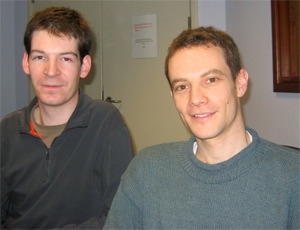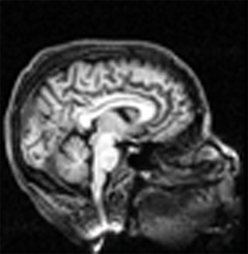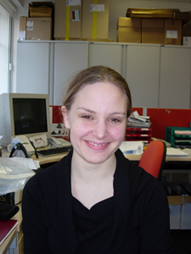Experiment of the month – Institute of Cognitive
Neuroscience
Research at UCL, from neuroscience to linguistics, is often based
largely on experiments involving willing volunteers, and departments
across the university are recruiting people to join in on their
experiments. The intrepid Clare Bowerman, UCL Communications
Manager, ventures boldly into the lab for a first-hand look at what
it's like to be a participant in an experiment…
Clare’s
view
“My first experiment was held at the
Institute of Cognitive Neuroscience (ICN), an interdisciplinary unit
at UCL which studies how mental processes relate to the human brain
in health and disease. Dr Jon Simons, Senior Research Fellow at the
ICN, along with Dr Sam Gilbert is leading research into memory, in
collaboration with Dr Paul Burgess and Professor Chris Frith. Jon
explained he’d be monitoring my brain activity while I answered the
apocryphal ‘simple questions’.
He then showed me to an MRI
scanner – a large, cylindrical-shaped magnet that uses a powerful
magnetic field to scan any part of the body in great detail; in this
case, the brain. I didn’t have to don a green robe before getting
into MRI scanner, but I had to remove anything metal before I went
for the scan; jewellery, piercings, keys, coins (and even underwired
bras) could all interfere with the results, or even be attracted
towards the scanner under the force of the magnetic field, putting
me off the tests a bit.
While the scanner made loud, clanking noises round my head
(slightly alarming but, as I was reassured, completely
painless/harmless) I looked at a computer screen in the scanner and
answered questions using a touch button. First of all, I was asked
to count how many letters were in the second word of a series of
well-known word pairs, when the word was either present or I had to
imagine it (apples & pears, Bonnie & ? …). Afterwards, I was
played back the word sets on the screen, and had to answer whether
or not I thought I had seen or imagined the second word of each
pair, and whether each had been displayed on the left or right hand
side of the computer screen. It was harder than it sounds (although
maybe that was just me). The session rounded off with a ten-minute
scan of my very own brain to take home and, presumably, print on a
mug to give to my relatives. It was a relief to see there is
at least something between my ears.”

Dr Sam Gilbert and Dr Jon Simons
|
Dr
Simons’
view
How would you describe your work in
simple terms?
I am interested in how we remember events
that we experience in our everyday lives. For example, why is it
that we are able to remember some past events clearly, with all
sorts of associated details about the context in which they
occurred, but others only vaguely if at all? We think that the
frontal lobes of the brain play an important role in this ability,
which may be a part of the rich conscious experience that makes us
uniquely human.
So why are you doing this particular test?
The aim of this experiment was to understand the
frontal lobe contributions to remembering events that were imagined
versus those that actually occurred. This is important for refining
our theories about which regions of the frontal lobe are involved in
making specific memory judgments, such as “did I actually experience
something in the external environment, or did I just imagine it
internally?”
What do you think you’ll find out from these experiments?
We think that a region at the very front of the brain,
known as brain area 10, might be central to such judgments between
internally-generated and externally-derived information.
Interestingly, there is evidence that this region may be one area of
the brain that shows changes in people with schizophrenia, a
psychiatric disorder in which people often have difficulty
discriminating between information that was perceived from the
external world and information that might have been
internally-generated. This difficulty may be critical to the
delusions and hallucinations that are typically seen.
What does my brain do when I answer the questions?
We are still analyzing the data from the experiment you
took part in, but typically regions of your brain (eg the frontal
lobes) work harder and use up more oxygen when you are engaged in a
demanding task such as remembering word pairs. We can measure
this change in oxygen use and show, for example, that different
sub-regions of area 10 might be involved at different stages of the
memory retrieval process.
What’s in it for me?
Our research is
supported by the Wellcome Trust, who are kind enough to provide all
our volunteers with up to £30 to cover their expenses (in the
interests of journalistic integrity Clare will be donating funds to
charity or refusing them). In addition, participants can be
satisfied in the knowledge that they have helped advance our
scientific understanding of what it is to be human!
Are there any side effects to doing the experiment?
No. The only risks to anyone undergoing an MRI scan
relate to the strong magnetic field involved, which means that
people with implants such as cardiac pacemakers, cochlear implants,
etc, cannot be scanned. Apart from the risk associated with metal,
there are no known after-effects of participating.
So am I average?
You actually did very well
at remembering whether you imagined words or whether you saw
them! Generally, we design our tasks to be sufficiently
difficult that people will fail to remember a number of the word
pairs. We can then examine brain activity that differs between
successful and unsuccessful memory, which we couldn’t do if
everybody got everything correct.
What’s your all-time favourite experiment?
The experiment I like most was actually conducted by Dr
Paul Burgess here at UCL. He was interested in understanding
multitasking, the ability to perform more than one task at the same
time, and how it was affected by damage to the frontal lobes of the
brain. He realized that one of the best examples of multitasking is
going to the shops with a list of things you need to buy, so he
proceeded to take all the participants shopping in London and
recorded their behaviour in great detail. The results provided a
number of original insights into the processes underlying
multitasking behaviour.
What do you like most about your job?
I very
much enjoy the creative side of thinking up experiments to test a
particular hypothesis that I’m interested in. I also get a lot of
intellectual satisfaction out of trying to understand the results of
the experiments, which aren’t always what I expected! Coming up with
a plausible interpretation can often involve just as much creativity
as thinking up the experiment in the first place…
Are you looking for further recruits?
We are
always looking for participants for our experiments. Individual
experiments vary, but taking part typically involves some kind of
computerised task, often looking at words or pictures on a monitor
screen and making decisions about them by pressing keys on a
keyboard. Volunteers must be aged 18–35 years, be right-handed, with
English as their first language. For more information, see our website.
If you would like to experiment on Clare, contact UCL Communications. To
find out more about Dr Simons, use the links at the top of the
article.
|






